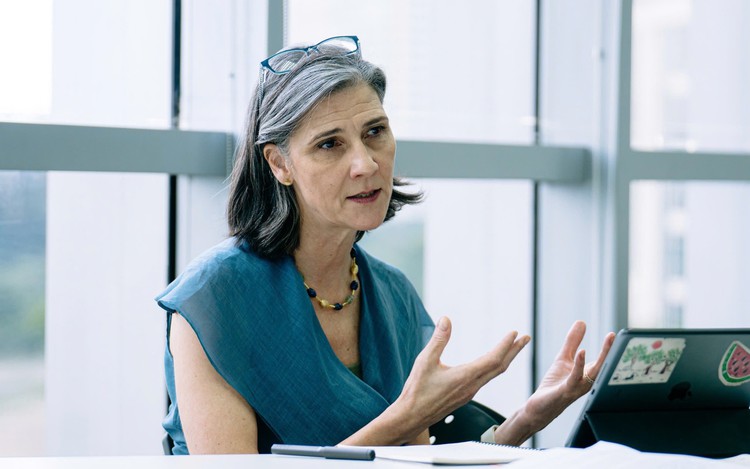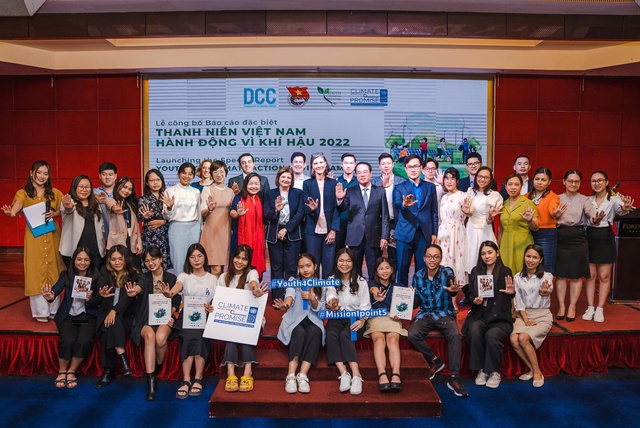
UNDP Resident Representative in Vietnam Ramla Khalidi is seen during a talk with Tuoi Tre News in August 2025. Photo: Thanh Hiep / Tuoi Tre
Here is what Khalidi discussed during the talk:
The country’s 40-year journey has created a spectacular transformation, highly appreciated by the international community.
Throughout this journey, Vietnam has received tremendous support from international friends, most notably the accompaniment from the very first days of the UNDP.
Healing past wounds
Vietnam has had an incredible journey of progress and achievement since the war, especially in the years since Doi Moi. In just a few decades, Vietnam has gone from a poor country with a struggling economy to a country that is flourishing, growing, and healing.
Millions of people have been lifted out of poverty, while education and literacy rates are incredibly high. Vietnam has managed to maintain a high human development index.
All of this is not because of one program or a single point solution. This is truly the result of a comprehensive, systematic approach from the government, one that places people at the center of development solutions. Vietnam has invested synchronously in infrastructure and human resource capacity, in healthcare, education, in both urban and rural areas.
There have been difficult moments, but I think the path Vietnam has chosen -- export-led, forward-looking human development and investment -- has helped the country weather those storms and continue on its development path.
Vietnam today needs to adjust its growth model to fit a new world, perhaps a model of inclusive, green, and sustainable growth.
Other countries, especially those emerging from war and conflict, have much to learn from Vietnam. From economics, politics, social cohesion to the approach to global integration.
I've always been particularly impressed by how Vietnam has approached the post-war healing process. It carries a strong focus on history and yet chooses a path forward, one that is built on the well-being of its citizens.
For me, that is the lesson about having a long-term vision. Not just five years, 10 years, but a vision of where the country will be in 50 years' time. I think the way Vietnam does this is truly inspiring.
UNDP has been here for almost 50 years and we are very proud of our partnership with Vietnam. We opened our offices in 1978 in Hanoi and have been privileged to accompany Vietnam's transformative journey from a war-torn country to a lower middle-income country.
I know from my predecessors that in 1990, UNDP was proud to support the government of Vietnam during the Doi Moi process. We supported the introduction of market economy principles, strengthening Vietnam's economic management capacities.
In particular, we participated in developing the 1999 Enterprise Law, thereby creating a level playing field for businesses. These contributions created new jobs and shaped the growth trajectory.
Today, as Vietnam continues to look forward and implements a new set of reforms, UNDP's integrated approach to development can continue to be of assistance to the government.
Whether it's technology and innovation, administrative reform, UNDP remains a trusted partner of the government of Vietnam.
To illustrate specifically, let me take the story of how UNDP accompanies Vietnam, specifically the Ministry of Agriculture and Environment in climate adaptation. UNDP has supported coastal communities to protect themselves by reinforcing and building thousands of model houses that are storm- and flood-resilient.
We bolster mangroves, creating spaces for these forests to play their role as both bulwarks against waves, carbon sinks, and diverse ecosystems. Communities there are also guided to improve their livelihoods and sustainably manage this ecosystem, toward the betterment of Vietnam. That's just one tangible example where I think UNDP has been able to make a modest contribution and put forward an example of economic and environmental management.
Contributing to the global community
I think Vietnam has shown strong commitment to the United Nations Sustainable Development Goals (SDGs) by integrating them into national planning through the National Action Plan for implementing the 2030 Agenda for Sustainable Development.
You have introduced the Vietnam SDGs (VSDGs), focusing on monitoring and evaluation through the Voluntary National Review (VNR) mechanism. Vietnam's achievements in poverty reduction and healthcare are also very impressive.
However, there are still some areas where Vietnam needs more effort. That's SDG 8 (Decent Work and Economic Growth). We need to ensure Vietnam both grows efficiently and shifts toward a green and circular economy.

UNDP Resident Representative in Vietnam Ramla Khalidi is with Vietnamese youth at the launch ceremony for the Special Report on Vietnamese Youth Action for Climate 2022. Photo: UNDP Vietnam
Vietnam has a very clear idea of how it wants to grow. It wants to have greater innovation, get out of the middle-income trap, and move toward greener growth. So I think investing in a skilled workforce capable of supporting that growth direction will be very important.
Another goal is SDG 10 (Reduced Inequalities). Recent decisions like free public education are excellent examples of ensuring everyone has access to the social wealth, growth, and prosperity that Viet Nam is aspiring to.
Finally, SDG 16 (Peace, Justice and Strong Institutions). This is an area that General Secretary To Lam has given much attention to in terms of administrative reform, enhancing accountability and transparency, as well as ensuring local and national authorities meet the needs and expectations of citizens.
For me, the SDGs are not just aspirations but also realistic goals for developing countries. They are designed to be universal and ensure everyone benefits from the progress achieved.
However, SDGs are not a magic solution but a blueprint. Every country needs to adapt them to their specific needs and context and according to the capabilities they are developing.
Vietnam has always been very present at the international stage, viewing multilateral cooperation as a strategic focus and actively participating in major mechanisms such as the UN General Assembly, Security Council, and Human Rights Council.
Hosting international forums like the Hanoi Cybercrime Conference and the signing of the Hanoi Convention shows Vietnam's leadership role and readiness to contribute to solving global issues.
These activities both enhance international standing and contribute to promoting sustainable development goals, affirming Vietnam's increasingly important role in the multilateral system.
Vietnam in my heart
Vietnam holds a very special place in my heart. Even before coming here, I had always admired Vietnam for the journey your country has traveled and the achievements made. It's always been inspiring.
Coming here, seeing it for myself, experiencing the dedication, hard work, and resilience of the Vietnamese people have been nothing short of inspirational.
After three years working here, getting to know Vietnamese colleagues and friends, celebrating with Vietnam its 50 years of Reunification last April, I feel extremely moved and proud.
I especially appreciate Vietnam's rich cuisine. More than that, I appreciate the sharing of the food, the way everybody comes and brings whatever they have for lunch to share with everybody else. For me, that's a sign of the generosity, warmth, and inclusion that Vietnamese people have for each other, for foreigners like me who are always invited to the table and to break bread together. For me, that is truly humbling and special.
Vietnamese youth, think big!
Vietnam's strength lies in its people and none more so than the youth -- the generation of innovators, thinkers, those who are bold and creative, carrying the responsibility of taking Vietnam into a new era. That responsibility lies on your shoulders and we place a lot of hope and trust in your leadership.
My advice to the youth of tomorrow is: you don't have to have all the answers. You just have to have the courage to ask the right questions. Nobody has all the answers, but I think we need to always be asking questions, always digging, exploring together with curiosity and empathy.
Imagine those new possibilities. Be bold in imagining a Vietnam not just of 2030, but of 2050, 2060 and 2070. Think big, think bold, be brave and be courageous in taking forward new ideas.
Lastly, stay grounded and proud. Vietnam, Vietnam’s traditions, Vietnam’s history, and Vietnam’s culture are all you need. While remaining open to the world, don't forget to root yourselves in those rich values to be able to take big steps forward.


Max: 1500 characters
There are no comments yet. Be the first to comment.